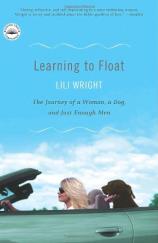Reading Group Guide
Discussion Questions
Learning to Float: The Journey of a Woman, a Dog, and Just Enough Men

1. At the beginning of the book, Lili sets off on a road trip alone to gain new insight into her failed relationships. Have you ever taken a journey of self-discovery? Do you learn more about yourself from being with other people or being alone?
2. Why do you think this memoir is called "Learning to Float"? How does floating act as a guiding metaphor for the book? Why does Lili compare herself to a mermaid?
3. One reviewer suggested that Lili approaches her romantic life more like a man than a woman. Do you agree? Do men and women have fundamentally different conceptions of sex and love?
4. At the beginning of the book, Stuart lashes out at Lili saying: "You've never loved anyone. You've never given anything." Did Lili treat Stuart fairly? What about her other boyfriends? Is it possible to put yourself first and still have a healthy relationship? What do you need to give a partner to make a relationship last?
5. What did you think of Lili's description of playing with Barbie? Can you look back at how you played with toys and see ways it foreshadowed the adult you became?
6. At the beginning of the book, Lili says she can't seem to get her heart, head and body moving in the same direction. Do you ever think one thing and feel another? When you face a difficult decision, do you listen to your head or your heart? What role, if any, does intuition play? Do you trust a decision even if you can't explain it?
7. How is Lili like her parents and how is she different?
8. In Utah, Lili dates several people in quick succession, often with an uncomfortable "overlap." Why does she find it so hard to commit to one person? Is this related to the pressure she feels to "settle down"? Have you felt similar pressures?
9. Lili tells Stuart that sometimes she forgets she driving and Stuart insists that means she's driving well. Lili says she can only do it when she is alone and then compares this to sex. What does she mean? Are there some things you do well alone but struggle to do with your partner? Why? Is it possible to think too much?
10. How do Nana's expectations for Sandy Bottom Beach relate to Lili's struggle?
11. In the chapter, "Back at the Bar," Lili describes the alternating euphoria and desolation she feels while traveling. What are the joys and challenges of traveling alone? Is it more rewarding to plan a trip or be spontaneous? Do bad trips make better stories?
12. In the Tangier chapter, Lili compares herself to crabs, which shed their shells many times as they grow. Lili realizes she has used her relationships to help her find herself. Have your romantic relationships helped you define yourself? Is there anything wrong with doing this?
13. In the chapter, "Fear of Flying," Lili Wright writes that although sex is a natural act, it didn't come naturally to her. Can you relate to this statement? How does our popular culture (movies, television and advertisements) portray sex and is that portrayal accurate?
14. In Edisto, Lili scolds herself for playing things too safe. Soon after, she climbs into the motorboat and goes shrimping with Troy and Randy, two men she has just met. Would you have gotten in the boat? Have you taken similar risks? If so, why?
15. In the scene at the black Baptist church, Lili defines grace as "the marriage of strength and surrender." How would you define grace?
16. What does Lili learn from Grampy? What role does he play in the book? What have your own grandparents taught you about love and life?
17. On the road, Lili meets many eclectic characters, from Troy, the redneck shrimper, to Leon, the vegan astrologer. How does she learn from the people she meets? Is it sometimes easier to take advice from a stranger than from a close friend or relative? Why? Do you see things differently when you're away from home?
18. While having her chart read in Key West, Lili muses that perhaps it doesn't matter so much which man you choose, what matters most is the faith you have in him. Do you think there is such a thing as a Mr. or Ms. Right? Or is there just a Mr. or Ms. More Right Than Everyone Else? How does this relate to Roger's question: "Who are you willing to fight for?"
19. As she drives into Key West, Lili says she feels "bolder, more optimistic." How has she changed?
20. What does Lili learn from the Woman Who Married Herself?
21. While wading in ocean off Little St. Simons (island in the final scene, Lili thinks: "We spend our whole lives swimming alone." Do you agree?
Learning to Float: The Journey of a Woman, a Dog, and Just Enough Men
- Publication Date: June 10, 2003
- Paperback: 352 pages
- Publisher: Broadway
- ISBN-10: 0767910044
- ISBN-13: 9780767910040







